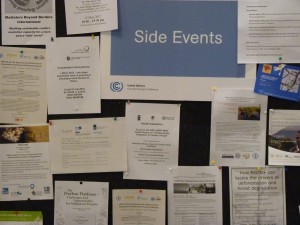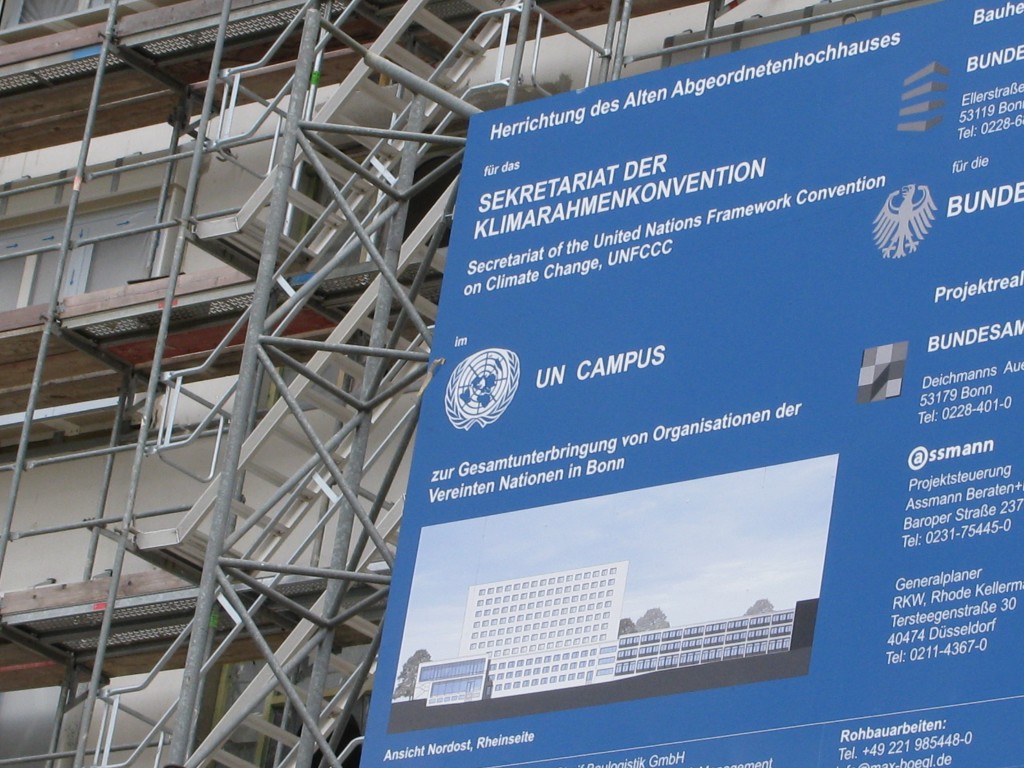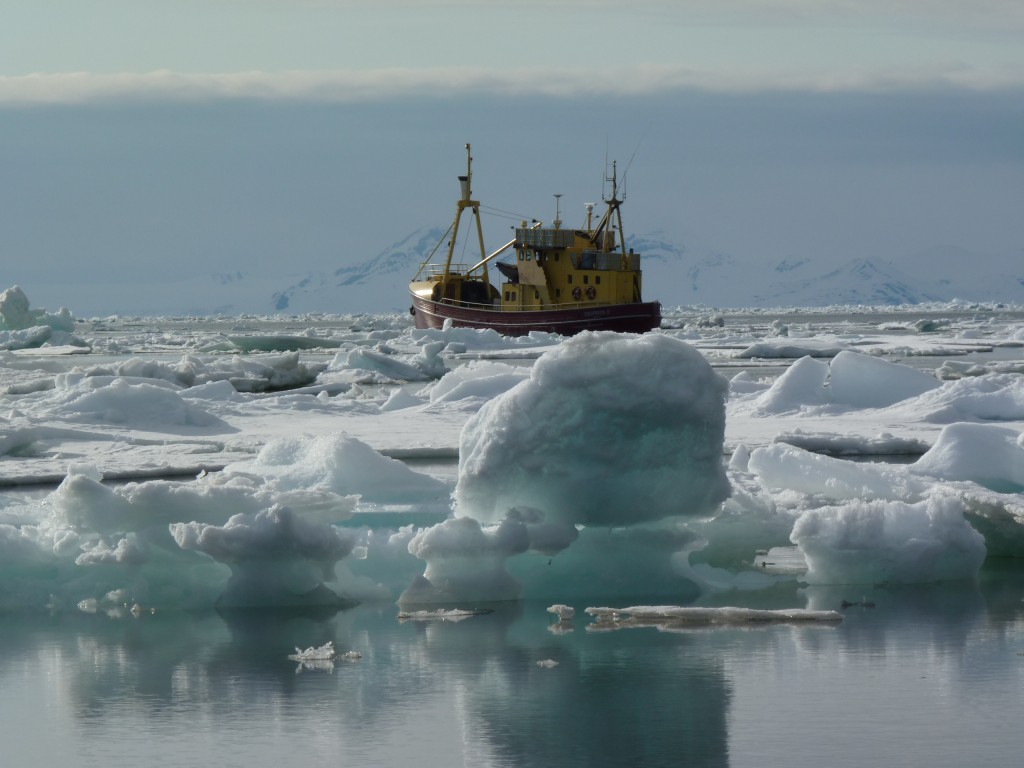Peatlands … on the fringes of the Bonn climate talks
The talks going on in Bonn right now are an “intersessional climate session”, i.e. talks between the talks… aimed at making progress on the issues to be decided at the next round of climate changes talks “proper” which will be held in Doha in Qatar at the end of the year. I would not have the patience these negotiators need, with the talks crawling along at what would seem to your average person to be a snail’s pace, considering the speed with which climate change is actively affecting our planet. It’s not easy to get countries to commit to emissions reductions, rainforest protection, financing for developing countries etc. But while the different working groups meet, filling the conference rooms of a large Bonn hotel and the nearby German Federal Environment Ministry, different organisations take the chance to publicise their work and new practical initiatives to work against global warming, in the corridors and foyers and in numerous “side-events”, which for me as a journalist are one of the most interesting things to follow at these gatherings.
![]() read more
read more
Climate agreement… under construction
Building work is continuing, to convert a building to host the expanding UN climate secretariat (UNFCCC) close to our Deutsche Welle offices here in Bonn. It strikes me as symbolic of what’s happening a few blocks away at the latest round of international climate talks. There, construction work to create a new international climate agreement continues to make slow progress. The meeting, which will continue until the end of next week, is the first since the Durban Climate Change Conference at the end of last year. The head of the UNFCCC Christina Figueres stressed at the start that there is still a gap between the agreed goal of a maximum 2 degrees C. rise in temperature (which an increasing number of experts are saying is not enough anyway) and the current global efforts. It’s hard to be optimistic. The negotiators have their work cut out for them.
I’ll be going round to the talks shortly to catch up on what’s been happening. Your ice blogger was on holiday for a couple of weeks, so apologies for the lack of updates. More on what’s happening at the Bonn climate meeting soon. Meanwhile, you might like to listen to this week’s edition of Living Planet, where there is a report I produced about the urgent necessity for adaptation to climate change. There are also some related stories on the website:
How much scepticism can the climate take?
Cities gird themselves for climate change
Changes at Germany’s Environment Ministry
New threat to Antarctic Ice shelf
Warm ocean currents are melting Antarctic ice
 Recent ice loss from Antarctica was mainly caused by warm ocean currents, according to a team of scientists led by British Antarctic Survey. In an article for the journal NATURE this week, they explain how they used new techniques to differentiate for the first time between the two known causes of melting ice shelves – warm ocean currents attacking from below and warm air melting from above. One worrying thing is that this means “we can lose an awful lot of ice to the sea without ever having summers warm enough to make the snow on top of the glaciers melt – the oceans can do all the work from below” says Dr. Hamish Pritchard from BAS, lead author of the report.
Recent ice loss from Antarctica was mainly caused by warm ocean currents, according to a team of scientists led by British Antarctic Survey. In an article for the journal NATURE this week, they explain how they used new techniques to differentiate for the first time between the two known causes of melting ice shelves – warm ocean currents attacking from below and warm air melting from above. One worrying thing is that this means “we can lose an awful lot of ice to the sea without ever having summers warm enough to make the snow on top of the glaciers melt – the oceans can do all the work from below” says Dr. Hamish Pritchard from BAS, lead author of the report.
The warm water melting the ice sheets is causing inland glaciers to speed up and discharge masses of ice into the sea. The reason the water is warming, is probably because of changes in wind patterns, caused in turn by changes in climate. This would mean “Antarctica’s glaciers are responding rapidly to a changing climate” says Pritchard.
Most of the ice shelves being melted by warm ocean currents are in West Antarctica. On the eastern Antarctic Peninsula the shelf thinning found by the study can be explained by warmer summer winds directly melting the snow on the ice shelves.
The results will help improve projections of future sea-level rise.
More here on the website of the British Antarctic Survey
Polar bears evolved earlier than previously thought

Polar bear genome shows they evolved much earlier than previously thought. Picture by Alan Wilson, www.naturepicturesonline.com
A team of scientists led by researchers from the German Biodiversity and Climate Research Centre (BiK-F) has found out that polar bears evolved as early as some 600,000 years ago. The study, published in the current issue of the journal “Science”, ( Nuclear Genomic Sequences Reveal that Polar Bears Are an Old and Distinct Bear Lineage, Hailer, F. et.al) says the white giants are thus five times older than previously realised.
Why do we need to know this apart from pure scientific curiosity? Because knowing when polar bears evolved as a genetically distinct species, different from brown bears, could help us understand what is going to happen to the polar bears if the planet keeps heating up. You can read more about how the scientists came to their conclusions and what implications they could have here.
China and the Arctic – “a public area, just like the moon?
Now who could come up with a statement like that? It has to come from a country showing a growing interest in the region although it has no Arctic territory. The Chinese premier Wen Jiabao is coming to Europe tomorrow and the Arctic is to be a key focus of his trip. He’ll be spending eight days visiting Iceland, Sweden, Poland and Germany.
There are two main reasons for the Chinese interest: energy, and shipping routes. China is the world’s biggest consumer of energy and greatly interested in the resources becoming more easily accessible through climate change. The retreat of the sea ice is also opening up new routes for shipping in summer, which could cut the sea voyage between Shanghai and northern Europe by around 6,400 km. So there are difficult times ahead for those who want to protect the sensitive Arctic environment and wildlife from increasing traffic and risky exploration for oil, gas and minerals. I wrote about this some time ago, and it’s certainly going to keep coming up:
Arctic Regions Eye Nation’s Potential
























Feedback